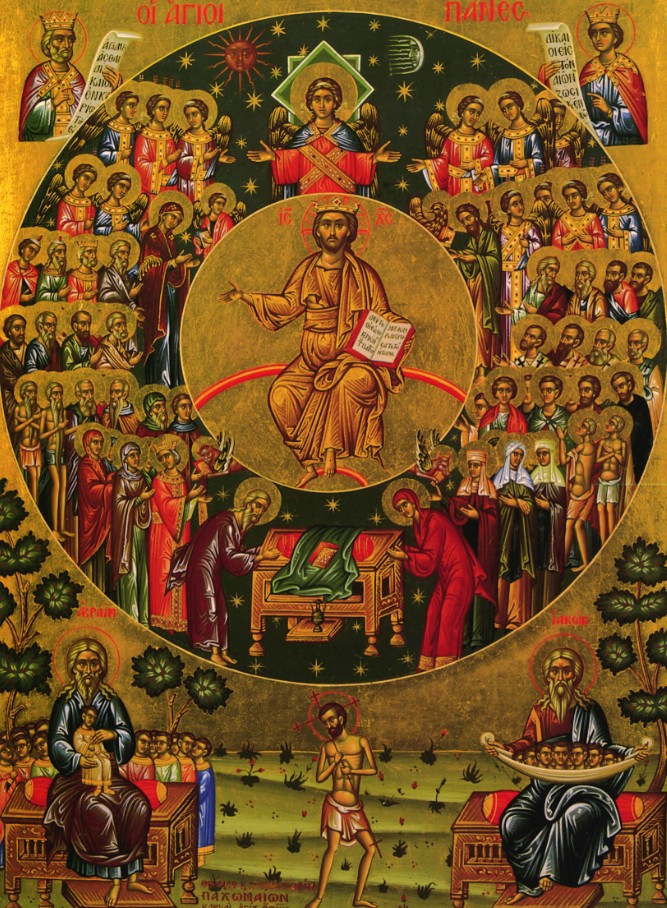- Home
- About us
- Students
- Courses
- Research
- Library
- News & Events
- Gallery
- Contact
- Our Blog
Latest News

The Cross and the Crown:
The Road to Sainthood

by Assoc. Professor Philip Kariatlis (Sub-Dean)
This coming Sunday, our Holy Orthodox Church invites us into a radiant celebration—the Sunday of All Saints. It is a day unlike any other: we do not honour a single saint, nor a particular group of saints—whether these be martyrs, monastics or confessors. Rather, we lift our eyes to the entire company of God’s friends—first and foremost, to the Theotokos, followed by the Apostles, the Prophets, the Martyrs, the Teachers, the ascetics, the righteous and the unknown—every man and woman of every time, every place, and every circumstance who sought Christ, and whose lives were crowned by divine love.
We honour them not simply for their extraordinary lives, but for their total trust and surrender to Christ and His love. We remember them not merely as distant figures in sacred history, but as a living and “great cloud of witnesses” (Hebrews 12:1) who now surround us; who strengthen us; gladden and uplift us; invite us to walk the same path as they did; and remind us that our ultimate purpose in life is to acquire the Holy Spirit. Furthermore, they stand as luminous beacons giving witness to a world without end; namely, to the liberating spaciousness of our Lord’s eternal Kingdom—to “the riches of His glorious inheritance” (Eph 1:17), “where the sound of festival is unceasing, and the pleasure is endless of those who behold the indescribable beauty of [His] countenance.”
But why does the Church place this feast here—immediately after Pentecost? The answer is profoundly theological: because holiness is a gift of the Holy Spirit, the fruit of Pentecost, the fulfilment of God’s plan for his creatures even before the foundation of the earth. The coming of the Holy Spirit into the world did not end with tongues of fire resting upon the heads of the Apostles. The miracle of Pentecost continues in the life of the Church today—because what the Spirit accomplished in them, He continues to do in every saint; and desires to do in us, if we give room for the Holy Spirit to enter our lives. Indeed, in the Gospel reading of the day, we are given insights as to how we might attract the living presence of the Holy Spirit.
The Gospel passage for the Sunday of All Saints reveals the heart of sainthood not as a far-off ideal, but as a living possibility today, in here and now. Christ tells us: “everyone therefore who acknowledges Me before others, I will acknowledge before My Father… and whoever does not take up the Cross and follow Me is not worthy of Me.” (Mt 10:32 & 38).These words are not easy. They are not comfortable. But they are words of life. Christ does not offer us a path of convenience, but a path of truth, a path towards the Spirit, who is the Spirit of truth (cf. Jn 16:13).
Christ invites us into transformation—not success, but sanctity; not mere effort, but surrender. For holiness is not our achievement; rather, it is the fruit of the grace of the Holy Spirit in a humble and obedient heart. To acquire the Holy Spirit is, in essence, to recognise the truth about ourselves: that we are weak, wounded, sinful, and in desperate need of healing. It is to confess that God alone is almighty, loving, long-suffering, and full of compassion. And thus, we must seek His mercy with all our heart, crying out with the voice of repentance: “Lord Jesus Christ, Son of God, have mercy on me, a sinner!” Such prayer, offered in sincerity, never goes unheard—for God does not will the death of His creation, but “desires everyone to be saved and to come to the knowledge of the truth” (1Tim 2:4).
We see this in the saints. They were not perfect; they were not without struggle or failure. Many suffered rejection, poverty, persecution—even martyrdom. Yet, with the grace and strength of the Holy Spirit they endured; they kept their hearts burning with longing for Christ. Their virtue was not self-made; it was Spirit-given. They recognised, as Christ said, “apart from Me you can do nothing” (John 15:5). Too often, we forget this. We think holiness is for others—those with more time, more strength, more faith. But the Sunday of All Saints reminds us: saints are not born, they are made through grace: a grace which gives patience through struggle, and a grace which bestows, through faithful love, the gift of enduring patience through life’s inevitable difficulties.
And here lies the mystery—we need to want to “take up the cross,” (Mt 10:38). With these words, Christ is not giving us a punishment. He is giving us a path towards life and joy! The cross is not an end—it is the way to the crown; the priceless and eternal crown. Just as Christ’s glory was His Cross, so too can our willingness to carry our own personal crosses in life become our glory. The saint is the one who walks this road day by day—even when it is steep, even when it is lonely—because they know who has walked this road before them and who continues to walk beside them.
In the Gospel reading, the apostle Peter gives voice to a question that lives quietly in many of our hearts: “Lord, we have left everything to follow You. What then will there be for us?”(Mt 19:27).And Christ responds not with rebuke, but with promise: “Everyone who has left houses or family or lands for My sake will receive a hundredfold—and inherit eternal life”(Mt 19:29). The saints are living witnesses that no sacrifice for Christ is ever forgotten. No act of love, no hidden tear, no quiet prayer is lost. What we offer to God in faith and above all in love becomes, in His hands, a crown of glory, our entrance into eternal life.
So what might this mean for us—here and now? It means that you and I are called to be saints. Not perfect, not flawless—but faithful. Faithful in love; courageous in hope. Steadfast in our desire to follow Christ above all else.The cross that we are called to embrace in our lives might be an illness, loneliness, grief. It might be the hidden battle to forgive. The heartache of raising children in a complicated world. The struggle to keep praying when God seems silent. These are not obstacles to holiness. These are the very places where holiness is born. For God sanctifies us through what we offer to Him in love
And most importantly, He does not leave us to do this alone. He sends us the Holy Spirit—the same Spirit who empowered the Apostles, who sanctified the Martyrs, who upheld the Monastics—to strengthen us, guide us, and shape our hearts. In re-orientating our life back to Christ, it remains for us, on a daily basis, to ask one simple question: “What can I do today to please Christ?” To please Christ is to love. Love not in word only, but in and through our deeds. We are called to love not the idea of humanity, but the person in front of us—our neighbour, our family member, even our enemy. For as Saint John reminds us, “If anyone says, ‘I love God,’ but hates his brother, he is a liar” (1 John 4:20).
This, too, was the path of the saints: they loved God by loving others. Their holiness was marked not by spiritual pride, but by open, generous, compassionate hearts. There is no saint who was not, above all, a person of love. Saint Isaac the Syrian offers the following encouraging words to us today: “Believe with all your heart that the Lord is merciful and gives grace to those who truly seek Him—not in proportion to our works, but according to the love of our souls and our faith in Him.”(Homily 6). God is not moved by the size of our achievements, but by the fire of our love. Saints are not those who succeeded in every task, but those who never stopped seeking Christ, never stopped trusting His mercy, never stopped loving.
On the Sunday of All Saints, the saints call us. Not from afar, but from within the communion of the Church. They urge us to become people of love—sincere, selfless, and unifying. They urge us to forgive, to heal, to let go of old wounds, to patiently endure. They urge us to love God and our neighbour with the same burning desire. For this is the path of the saints. This is the fruit of Pentecost. This is our calling and the fulfilment of our existence. Let us carry our crosses faithfully. Let us live with love, and let us trust that even in our afflictions, God is preparing us for glory. Today the saints enjoin us: make a beginning in God’s work with joy, and in a wondrous waythe cross we carry today will become the crown we shall receive in eternity.



.png)